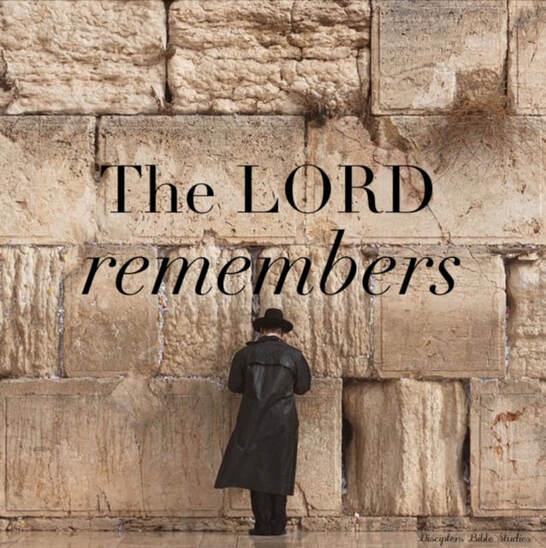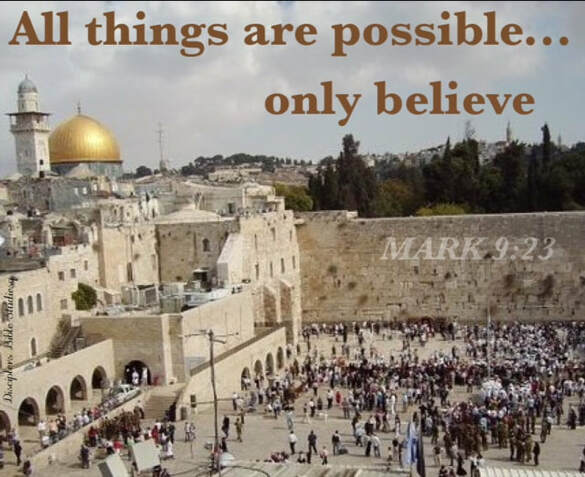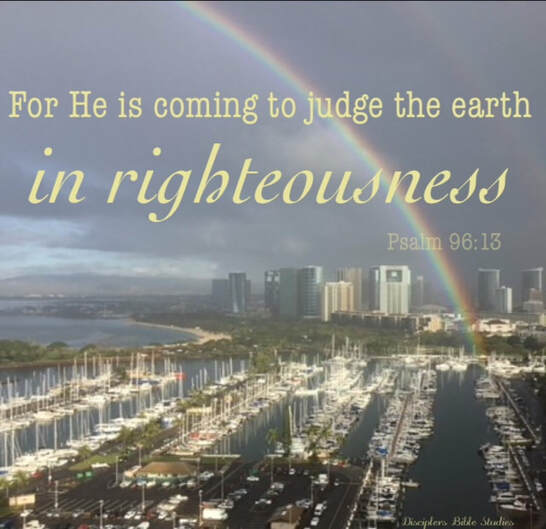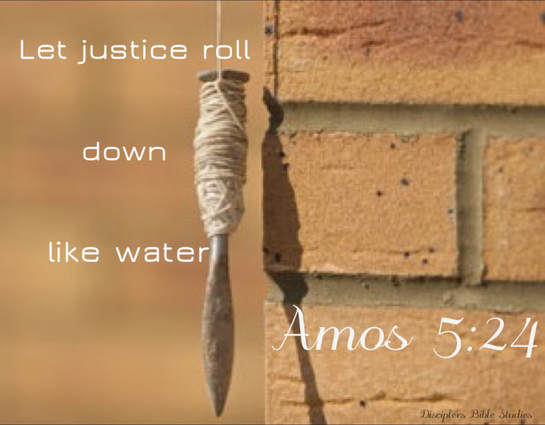 The very last of the twelve Minor Prophets is Malachi, who delivered his message about one hundred years after Haggai and Zechariah, the two prophets before him. You will recall that both Haggai and Zechariah delivered God’s message to the people of Judah, who had recently returned from a seventy year exile in Babylon. The people had been tasked with rebuilding God’s temple, but had met with opposition and become discouraged. They soon stopped working and succumbed to selfishness and sin. Haggai and Zechariah both delivered messages of reproof, encouragement, and hope, and as a result, the new temple was completed. One hundred years later the people had again fallen into sin, and this time God raised up Malachi to confront them with their sins, call them to return to Him, and warn them of the coming day of the LORD. “For behold, the day is coming, burning like a furnace; and all the arrogant and every evildoer will be chaff; and the day that is coming will set them ablaze, so that it will leave them neither root nor branch. But for you who fear my name, the sun of righteousness will rise with healing in its wings; and you will go forth and skip about like calves from the stall….” (Malachi 4:1-2) After God spoke His message through Malachi, there were four hundred years of silence -- four hundred years without one word from God. And then came John the Baptist, who preached repentance and preparing the way for LORD. Although he was silent for four hundred years, God was still working behind the scenes for the good of His people. Even when His people fail Him, God's love is stronger than our failure. His love never fails. In reading Malachi’s prophecy, I found it interesting that the sins of God’s people today are not so different than the sins of the people in his day, four hundred years before Christ. The attitudes and actions of the Jewish people way back then are an ancient picture of many Christian attitudes and actions today. In his commentary, The Minor Prophets, James Montgomery Boice points out that Jewish religiosity in Malachi’s day perfectly pictures modern Christian attitudes that attempt to “bring God down to earth and measure Him by the yardstick of human morality.” Seven times in Malachi, God confronts the people with a statement of what He has done for them and seven times their response is an arrogant “How?” They show no honor or respect for God. Here are God’s seven statements and the responses by the people. (1:2) “I have loved you” -- “How have you loved us?” (1:6) “You, O priests, have despised my name” -- “How have we despised Your name?” (2:7 “You are presenting defiled food upon my altar” -- “How have we defiled You?” (2:17) “You have wearied the LORD with your words” -- “How have we wearied Him?” (3:7) “Return to me and I will return to you” -- “How shall we return?” (3:8) “You are robbing me…in tithes and offerings” -- “How have we robbed You?” (3:13) “Your words have been arrogant against me” -- “What have we spoken against You?” It’s easy for us to look at this list and say that none of these things apply to us, but that is arrogance on our part. Stop and think for a minute. Have you never questioned God’s love by complaining that you want or need more than He has given you? Have you ever coveted more in the way of material things, or have you compared yourself to someone who has a more important position in the church? If so, you have doubted God’s love for you. The priests despised God’s name by offering imperfect sacrifices of lame and sick animals they would surely never offer to a secular leader. Have you ever despised God’s name by giving Him only what is leftover instead of what you know would be your best? This can apply to both your material wealth and your time. The people of Malachi’s day wearied God by calling good evil and questioning His justice. Have you ever done that? Have you ever looked upon God’s views in the Bible as being outdated? Do you do things your own way just because everyone else does? Has your church veered away from following practices that are plainly Biblical? Have you ever questioned why God allows “natural disasters” or other painful occurrences? Have you ever wearied God with arrogant words in trying to twist His words to suit your own situation or point of view? Have you robbed Him of tithes and offerings? Are you ever so arrogant that you think you don’t need to take stock of your life and turn around and follow God completely instead of putting yourself first? If you can see yourself in any of these sins of the Jewish people, then God is calling you to return to Him. He’s calling us, from the pages of His Word and the Book of Malachi to face up to our individual and collective sins and return to Him. But the greatest thing is that He also calls us to the same hope to which He called His people in Malachi’s day, “For you who fear my name, the sun of righteousness will rise with healing in its wings; and you will go forth and skip about like calves from the stall (Malachi 4:2). This is the promise He made to the people of Judah, and four hundred years later Jesus Christ, the sun of righteousness, was born. He was the only person on earth who ever lived a perfectly righteous life. He endured the cross for our sins, but He rose again from the dead. And the promise for us is that He is coming again! The Day of the Lord is coming. It will be a day of judgment for those who do not honor God, but a day of salvation and joy and glory for those who love and obey Him. That is our hope as we live in this fallen world. God may call us to difficult times and tasks, He may hold us strictly accountable to His Word and discipline us when we go astray, but He always keeps His promises and His love never fails. May our love for Him prove unfailing as well. ~Suzie
1 Comment
 -Along with the prophet Haggai, Zechariah was one of nearly 50,000 Jews who returned to Judah from exile in Babylon in response to the decree of king Cyrus (538 B.C.) to rebuild the temple in Jerusalem. The people had begun work on the temple, but after laying the foundation, discouragement set in and sixteen years passed with no progress. So God called first Haggai and then Zechariah, often referred to as "prophets of the restoration", to call the people to return to Him and resume building. God first raised up Haggai who pointed out the people’s sin and selfishness in failing to complete the work they had been called to do, to call them back to work, and to convey God’s promise to bless them as they labored. Haggai’s prophecy was both an exhortation to motivate the people to return to work and a word of encouragement to complete the job. Zechariah prophesied after the people had resumed rebuilding, and his main purpose was to give the people moral support, confidence in the Lord, and hope for the future as they obeyed Him and completed their work in the midst of opposition from their pagan neighbors. Zechariah’s prophecy begins with an oracle and eight visions calling the people to return to the LORD and serve Him with sincerity of heart. His theme is, “look to the future”. It was vitally important that the temple be built because one day in the future the glory of the Messiah would dwell there and fill it. That day of blessing could never come unless the people were obedient to God. As one commentator put it, they were not just building a temple. They were building the future. The Messiah was coming and they should work on the temple with whole-hearted joy and enthusiasm. Zechariah’s is a prophecy of encouragement. Zechariah conveys “the word of the LORD” to entreat and encourage the people. In the prophecy of Zechariah, we see what a great encourager our God is. He never leaves us alone to amble blindly through our sojourn here on earth, but He speaks to us through His Word. He spoke to his people who lived 500 years before Christ through the prophets He sent. In His Word, He speaks to us through those prophets also, as well as through the gospel writers and apostles and his disciples in the New Testament. He has spoken to us through His servants through the ages to encourage us right where we are here and now in the twenty-first century. And His message way back in the days of Haggai and Zechariah is the same message He encourages us with today. Jesus is coming to save us and set things right. He’s coming to deliver us from evil. He’s coming to revive us, restore us, and renew us. He’s coming so we can rejoice right here and now in the knowledge and hope that He gives us in His Word. The final chapter of Zechariah’s prophecy is an oracle about the Day of the Lord - a future day seen by many of the prophets - a day of judgment for the wicked but of salvation and joy for God’s people. Zechariah tells us it will be a day when the remnant of all nations will worship the King, the LORD of Hosts (Zechariah 14:16) and it will be a day of “HOLINESS TO THE LORD”. Do you need encouragement? Do you need encouragement to get through your day, to go to work, to care for your children, to get your school work done, to be faithful to you ministry at church, or even just to go out and face the world and other people in your neighborhood, at church, on the freeways, in the supermarket? Don’t we all need encouragement? And we see in the prophecy of Zechariah that the Lord our God is our great encourager. Did you know that soon after Zechariah prophesied there was a period of 400 years of silence when there was not one word from God to His people. God did not raise up any prophets for 400 years! It was not until John the Baptist came, as a forerunner of Jesus, the Messiah, that God again spoke to the people. But He had given them amazing encouragement through the message of Zechariah. Even Zechariah’s name, which means, “The LORD remembers” was an encouragement. And that should be an encouragement to us as well. The LORD does remember. He remembers you and He remembers me and He remembers every promise He has made to us in His Word. And He will keep every one of those promises. So don’t ever be discouraged. Sit down for a few minutes (or as long as you like) every day and encourage yourself in His Word. I promise that as you read and soak it in and apply it to your life, you will experience the encouragement of the LORD. With love, ~Suzie  If you are a classical music lover or if you have ever been to an Easter performance of George Frederick Handel’s Messiah, then you may already know something of what Haggai’s prophecy is all about. Very early on in that magnificent oratorio the choir announces, “The glory of the Lord shall be revealed!” And this is followed by a powerful bass solo which proclaims the words of Haggai 2:6-7 “For thus saith the Lord of hosts; Yet once, it is a little while, and I will shake the heavens, and the earth, and the sea, and the dry land; And I will shake all nations, and the desire of all nations shall come.” Handel composed the “Messiah” in 1741, and I’m sure millions of people all over the world have been to performances from that time to this. Perhaps this could make Haggai the most famous “minor prophet” of all. And the Book of Haggai is only two chapters long. Haggai wrote at the time in Israel’s history after the northern kingdom of Israel had been defeated and destroyed by the Assyrians and the southern kingdom of Judah, along with its lovely city of Jerusalem and temple, had experienced a similar fate at the hands of the Babylonians. The people of Judah were exiled to Babylon and lived in exile there for seventy years until God moved the king, Cyrus, to send a contingent of Jews back home to rebuild the temple that had been destroyed. Although many Jews had settled down and become comfortable in Babylon, a fairly large group returned to Jerusalem to begin work on rebuilding the temple. When they laid the foundation, the people celebrated and praised God for His grace and goodness to them. But many of the older people wept aloud because they remembered the glory of the former temple and knew that it could never be the same. Discouragement grew as many difficulties arose. The surrounding pagan peoples opposed and plotted against the Jews until their discouragement turned into defeat. The building was stopped and other priorities, such as building their own homes, took precedence in their daily lives. The people lived for fifteen years in an atmosphere of economic hardship. They were apathetic and demoralized. Are you ever been like those returned exiles? Have you ever felt God calling you to a task but then become discouraged and failed to finish? Perhaps you questioned if you really heard God calling in the first place? Or maybe you compared your work to someone else and began to feel that yours was inferior and God was not blessing you. Or perhaps you quit because those around you failed to support your efforts or even worked against you. Or maybe the task was much more difficult than you anticipated. Haven’t we all been tempted in some situation like one of these? Maybe you’re facing a similar difficulty right now. If you’ve ever been tempted to be a quitter, God has a message for you, and it is found in Haggai’s prophecy. It was fifteen years after the quitters quit, that God raised up the prophets Zechariah and Haggai to call the people to reassess their situation and their priorities and get back to the task of rebuilding the temple. And, as is typical in God’s Word, the messages to the Jews way back then are applicable to us in the twenty-first century as well. Haggai’s prophecy is a series of messages from God, beginning with a challenge to the people to take a close look at themselves and get back to construction. Happily, this is followed by a positive response from the people and their obedience in taking up the challenge, even though they were deeply discouraged. The final portion of Haggai’s prophecy is filled with encouragement from God. He reminds the people that He is with them and He will judge those who have opposed and mistreated them. He has rich blessings in store for them, and He will keep His promise to bless the whole world through them. It is God’s message of encouragement in Chapter 2, verses 6 and 7 that Handel wrote into his “Messiah”, it is the promise of the Messiah and His coming to set all things right. “For thus saith the Lord of hosts; Yet once, it is a little while, and I will shake the heavens, and the earth, and the sea, and the dry land; And I will shake all nations, and the desire of all nations shall come.” And isn’t that where we should find our encouragement? The "desire of all nations" has come and He has told us that "All things are possible to him who believes" (Mark 9:23). God did not call us to begin and then quit. He called us because he had good works planned for us before the foundation of the world (Ephesians 2:10). He called us to be a blessing to those around us -- a blessing which He will use to spread His Name and His Glory throughout the world. Who knows how far your small local influence may be spread by the power of God and His Holy Spirit. I hope you’ll read Haggai’s prophecy. Then go see a performance of the Messiah this Easter, And be encouraged to carry on with joy where God has called you. With love, ~Suzie  The prophet Zephaniah spoke to the people of Judah at a time when the whole nation had turned away from God and was full of wickedness and corruption. Everywhere, from the elders and officials to the common citizen, the people had forsaken the LORD. Zephaniah compared the judges to rapacious wolves who roamed about in the evening darkness. The prophets were faithless, proclaiming what was in their own hearts and minds. Instead of God's word, they spoke words that tickled the people’s ears. Even the priests perverted the law and failed to lead the people in true worship of God. Men like Zephaniah, who loved God and proclaimed His word, were few and far between. As I read the three short chapters of Zephaniah’s prophecy, it reminded me of our world today. Somehow, it doesn’t surprise me when I hear many people say they can’t bear to watch the news anymore. Neither can I. It seems like the news is filled with stories of corruption, hatred, vitriol, self-centeredness, egotism, opportunism, and just plain evil. We seem to live in a world where God has given us over to our own selfish desires, and the world seems to be spinning in a downward spiral, as it did in the Biblical days of the Judges. I think Zephaniah must have felt the same way in his day. And Zephaniah longed for justice. When you read or watch news on TV, does your heart ever long for justice? Do you long to see justice in government, justice in our judicial system, justice for the powerless, the innocent, the helpless, and for everyday men, women and children who are taken advantage of by those who wield power? If you long to see justice roll down like waters (as the prophet Amos did -- 5:24), you need to read Zephaniah’s prophecy. His is a promise of sure justice to come. Zephaniah foretells the day of God’s judgment, the Day of the LORD. Zephaniah’s heart must have been filled with outrage and pain at the apostasy he saw all around him, because the LORD used Zephaniah’s voice to rebuke the people of Judah and give them warning of the judgment to come. Through Zephaniah, the LORD commanded the people to “Be silent….for the day of the LORD is near” (1:7) and He described a day when His sovereign will would be manifest in a fearsome and final day of judgment which no one will be able escape. “Near is the great day of the LORD, Near and coming very quickly, Listen, the day of the LORD! ……a day of wrath… A day of trouble and distress, A day of destruction and desolation, A day of darkness and gloom, A day of clouds and thick darkness” (Zephaniah 1:14-15). Zephaniah’s prophecy describes the sins of mankind that aroused God’s wrath to bring judgment. He describes the sins of Judah and then the sins of the surrounding nations: sins of idolatry, violence, deceit, double-mindedness, self-indulgence, arrogance, pride, corrupt deeds, and trust in riches rather than God. The day of the LORD will be a day of universal judgment, for all have sinned. It will be a day when all who have turned away from God and refused to listen to Him and His Word will stand before Him and quake in their boots. They will blindly grope for a way of escape, but it will be futile. Deliverance from God’s wrath will be impossible. No one will be able to purchase redemption for, God does not take bribes. No amount of silver and gold will save the wicked on that day, for they will stand condemned by their own sin. At that time, Amos’ desire will be fulfilled. Justice will roll down like waters and righteousness like an ever-flowing stream (5:24). The final verses of Zephaniah’s prophecy tell of the "remnant" -- of those “humble and lowly people” who have sought refuge in the LORD (3:12-13). He will be with them, He will remove all judgment from them, and He will rejoice over them (3:17) And the remnant will shout for joy with all their heart (3:14). But it will not be only the remnant of Israel who will be saved. The New Testament shows us that Zephaniah’s prophecy is universal in scope. On the day God has set (the day of the LORD), He will judge the world in justice and righteousness through the Man whom He has appointed (Acts 17:31), Jesus Christ. All those who have rejected Him will be judged on that day (John 12:48), but as the apostle Paul wrote, ....there is laid up for me the crown of righteousness, which the Lord, the righteous Judge, will give to me on that Day, and not to me only but also to all who have loved His appearing." (2 Timothy 4:8). So if you belong to Jesus Christ and you love and long for His appearing, do not become discouraged by the news of the world and the reprehensible things you see going on around you. Remember: the day of the Lord is coming when justice will be served and all will be set right and made new. The end of His story (history) has already been written. The apostle Paul wrote in 2 Corinthians 2:14, Thanks be to God, who always leads us in triumph in Christ, and manifests through us the sweet aroma of the knowledge of Him in every place. So find hope and comfort in the knowledge that we will triumph in Christ in the end. And in the meantime, we triumph where placed where God has placed us by being the sweet aroma of Christ in a bitter and needy world. With love, ~Suzie  Martin Luther was a monk, priest, professor of theology, composer, and one of the most important figures in the Protestant Reformation. As a young monk, Martin Luther worked hard, denied himself, and even inflicted physical punishment on himself, seeking to live a righteous life and be justified in God’s sight. With his whole heart he sought to please God, but in his mind he knew he could never measure up. No matter what he did, he could never be pure and holy in the sight of God because he knew he was a sinner. As he searched the Scriptures looking for a solution to his dilemma, God graciously led him to the Book of Romans where he read: The righteous man will live by faith (1:17). By the grace of God’s Holy Spirit, Martin Luther’s eyes were opened to see that all his sacrifices of hard work, self-denial, and self-punishment were in vain. It was only by God’s grace that he could find ease for his conscience, be justified, and stand as righteous before God. His works were nothing but “filthy rags” (Isaiah 64:4). It was his heart of faith, in itself a gift from God, (Ephesians 2:8) that gave him right standing before his Creator and Sustainer. That one short sentence, The righteous man will live by faith, changed Martin Luther’s life and ended up changing the world. But the apostle Paul, in the Book of Romans, was not the first to make that profound and life-changing statement. Hundreds of years before Paul wrote, the prophet Habakkuk had a conversation with God concerning justice and the judgment of the wicked. Before Habakkuk's time, the northern kingdom of Israel had been invaded and carried into exile by the Assyrians because of their rebellion against God and their evil ways. Habakkuk was disturbed because he saw that same rebellion and wickedness in the people of the southern kingdom of Judah in his day. Habakkuk wanted justice to reign, so he took his complaint to God and waited for God’s reply. Chapter 2 of the Book of Habakkuk is God’s answer to the prophet, and in His answer, God proclaimed, Behold, as for the proud one, His soul is not right within him; But the righteous will live by his faith (Habakkuk 2:4). The problem with the people of Judah was their pride. They thought they could live as they pleased. After all, didn’t all the other nations live prideful lives of wanton pleasure, greed, and violence? The people of Judah thought they could scorn God by ignoring His Law and mistreating one another but then turn to Him and find approval by offering their sacrifices. They considered themselves God’s people, but their hearts were not right with Him. In this one simple statement by God, we see that the heart is the most important thing. God does not look upon our sacrifices but upon our hearts. God’s people must be people of faith and it has always been that way. It is by faith we believe in God and His Word and obey Him. The proud person lacks understanding of God’s grace and power and is unable to live a life pleasing to Him. So God says, “His soul is not right within him.” The person who stands as righteous before God humbly admits there is nothing he or she can do to earn the grace of God. The righteous person takes God at His word, humbly taking God’s promise to heart, “By grace you have been saved through faith; and that not of yourselves, it is the gift of God; not as a result of works, so that no one may boast” (Ephesians 2:8). Salvation is God’s grace, freely offered, and accepted humbly by faith. Habakkuk, the prophet, is a beautiful example of one who lived by faith. The final chapter of his prophecy is a prayer, written as a song, in which he asked to see God’s justice and mercy. His song closes with a confession of his faith and expression of his trust in God. May we all take Habakkuk as our example and live by faith. Though the fig tree should not blossom And there be no fruit on the vines, Though the yield of the olive should fail And the fields produce no food, Though the flock should be cut off from the fold And there be no cattle in the stalls, Yet I will exult in the Lord, I will rejoice in the God of my salvation. The Lord God is my strength, And He has made my feet like hinds’ feet, And makes me walk on my high places (Habakkuk 3:17-19).  Sometime before the fall of Nineveh in 612 B.C., the prophet Nahum preached a message proclaiming judgment upon the city. That is similar to what the unwilling and defiant prophet, Jonah, had done about one hundred years before. It was during the first half of the 8th century that God had sent Jonah to march through the city of Nineveh and proclaim, “Yet forty days, and Nineveh shall be overthrown!” (Jonah 3:4). Surprisingly, at that time, the pagan people of Nineveh, from the king down to the lowest peasant, believed God and they repented. The king of Nineveh published a decree that everyone should “call on God earnestly that each may turn from his wicked ways and from the violence which is in his hands” in hopes that God would “relent and withdraw His burning anger” (3:8-9). God, in His mercy, spared the city. One century later, Nineveh had grown to be the largest city in the world. Nineveh had become the capitol of Assyria, the most powerful nation on earth, economically, politically, and militarily. But in pride and arrogance, Nineveh had also become the most idolatrous, violent, oppressive, morally perverted, and cruel place imaginable. The prophet Nahum called it “the bloody city” (3:1). At the time Nahum prophesied, Assyria had conquered the northern kingdom of Israel and proudly boasted they would also bring down the kingdom of Judah. The people of Judah lived in fear of the Assyrian army, as did the rest of the world. So God sent Nahum to comfort His people with the announcement that Nineveh would be wiped from the face of the earth. The people of Nineveh thought their city was invincible, surrounded by walls 100 feet high and a moat 150 feet wide and 60 feet deep. But Nahum proclaimed that God would bring down judgment upon those who scorned His law and treated His people with contempt. “Nineveh would fall because it was a godless and idolatrous city, a city of violence, lust, and greed” (from the ESV Student Study Bible, “Introduction to Nahum”. God had shown His mercy, but now He would judge the wickedness. Nahum says, The LORD is good (1:7) and slow to anger (1:3), but He will not leave the wicked unpunished (1:3). God is a God of compassion, mercy, and patience, but He is also a God of justice. He forgives those who repent and turn to Him, but judges the wicked, who revel in their sin. Nahum’s words are both a comfort and a warning to all people. His words are comforting because they tell us God is kind and patient with sinners. His words are a warning because they show there is a limit to God’s patience. He will surely judge those who willfully and habitually sin against Him. Nahum’s prophecy brought comfort to the people of Judah and to all people who lived in fear of the Assyrians. Behold, on the mountains the feet of him who brings good news, Who announces peace! Celebrate your feasts, O Judah; Pay your vows. For never again will the wicked one pass through you; He is cut off completely (Nahum 1:15). Nahum said Nineveh’s end would come “with an overflowing flood” (1:8), and he was right. In 612 B.C. while the Babylonians were besieging the city, the Tigris River overflowed its banks and destroyed a portion of Nineveh’s mighty wall. It was just enough to make a pathway for the Babylonians to enter and make an end of the wicked city. Nineveh was so completely demolished by the Babylonians that its remains were not discovered until 1842! When threatened with destruction, the people of Nineveh repented, but one hundred years later a new generation was even more arrogant, cruel, and defiant of God. Galatians 6:7 tells us, Do not be deceived, God is not mocked; for whatever a man sows, that he will also reap. This was true of the city of Nineveh and is a timeless truth of God in relation to all people and nations. In Jonah’s day the people of Nineveh had repented and reaped mercy. The following generations defied God and reaped judgment. Like the people of Nineveh to whom Jonah preached, every person has a choice: the choice to repent of his or her sin and turn to God, or the choice to live in rebellion against Him. The results of those two choices are polar opposites. The first leads to salvation and eternal life while the later leads to judgment. As believers, the messages of Jonah and Nahum should be a comfort. Knowing we are God’s people and living for Him, we are assured of His mercy and grace. And although it often seems that evil runs rampant in this world, we have hope in God and trust the day will come, as God has promised, when all wickedness and those who perpetrate it will be judged. God is sovereign and He is true to His Word. Nahum proclaimed that God always has His way and then adds, “The clouds are the dust of His feet” (Nahum 1:3). Since studying the Book of Nahum, every time I look at the clouds I think of the sovereignty of God and the truth and power of His Word. His Word is a comfort to me. May you always find comfort and peace in God’s Word. With love, Suzie Job 36:6 “He does not keep the wicked alive, But gives justice to the afflicted.” Psalm 37:28 For the Lord loves justice And does not forsake His godly ones; They are preserved forever, But the descendants of the wicked will be cut off. Psalm 145:20 The Lord keeps all who love Him, But all the wicked He will destroy. 1 Peter 3:12 “For the eyes of the Lord are on the righteous, And His ears are open to their prayers; But the face of the Lord is against those who do evil.” 2 Peter 2:9 The Lord knows how to rescue the godly from temptation, and to keep the unrighteous under punishment for the day of judgment.  The sixth of the Minor Prophets, Micah of Moresheth, was a bold prophet of God who openly denounced the sins of the people of Israel and Judah. But he especially brought to light the sins of the leaders, the judges, priests, and prophets, who put their confidence in power and profit and caused the people to suffer because of it. In this sense, I would venture to say that Micah was a political prophet. His prophecy shows how the sins of the leaders of a nation filter down to the common people and have a devastating effect on them. The people suffer for the sins of their leaders in two ways: 1) without principled leadership, the moral principles of the nation decline and 2) when the leaders of the nation are punished, the people also reap the judgment the leaders have sown. Micah first condemns the sins of the powerful people who work out evil schemes in their minds as they lay in their beds at night. When morning comes, they go and carry out their sinful plans simply because they have the power to do it. They take advantage of the powerless, oppressing them by taking their houses and fields. These powerful people have told Micah to keep his mouth shut, but he knows that if he keeps silent the sinful ways will continue, and he feels someone must stand up for those who do what is right. Next, Micah challenges the nation's leaders and confronts them with their sins. The rulers, referring to the judges, who were supposed to uphold justice, twisted it by taking bribes. The priests, who were called by God to ceremony and sacrifice and to teach the people His law, taught for monetary gain. And the prophets, who were supposed to speak God’s Word and convey His will to the people, “led the people astray”, looking out for their own interests rather than the interests of the people. They “divined for a price.” The word “divined” implies they were involved with magic and the occult, which God had forbidden. Money and power were foremost in the minds of the nation’s leaders. Micah paints a sorry picture of the society in Israel and Jerusalem in his day (the late 7th and early 6th centuries B.C.) and he makes it clear that judgment is coming. However, his prophecy ends with words of comfort and hope for “the remnant”, those who have bravely stood on the side of God’s law and honored Him. He proclaims the greatest prophecy of all: the coming Deliverer from Bethlehem who will gather and shepherd His sheep. “He will be great to the ends of the earth. This One will be our peace” (5:4-5). In reading about Micah’s prophecy, it may have reminded you of our world today with corruption in high places and the self-centered greed for power and money. Such attitudes and actions cannot help but have an effect on all of us, but we need not be infected by it and let it poison our lives. We can, and we need to, stand strong as God’s people and we need to live for Him. Micah tells us what God requires of us as His people: He has told you, O man, what is good; And what does the Lord require of you But to do justice, to love kindness, And to walk humbly with your God (6:8)? And near the end of his prophecy, Micah tells us what he will do: But as for me, I will watch expectantly for the Lord; I will wait for the God of my salvation. My God will hear me (7:7). So will you be influenced by the world, or will you be like Micah? As we humbly immerse ourselves in God’s Word and expectantly wait, seeking to live to glorify God, He will hear us. And He gives us hope and comfort in knowing that judgment will come for those who defy Him. When that day comes, as it surely will, it will mean salvation for those who do justice, love kindness, and walk humbly with our God. with love, ~Suzie  Of all twelve Minor Prophets, I think Jonah is the most interesting - maybe even amusing. I also think he is the one we can most easily relate to - not because he got swallowed by a whale, but because he tried to run away from God. God called Jonah to preach a message of judgment to the wicked people of Nineveh who were fearsome enemies of the Jews. Jonah refused and ran in the opposite direction. You’ve probably heard the story. Jonah got on a boat that could take him as far away from Nineveh as he could get. But God sent a storm that was eventually the cause of Jonah being thrown overboard, swallowed by a whale, and carried back to land so he could obey God and go to Nineveh to proclaim his message. Now maybe you think it’s preposterous that a man could be swallowed by whale, let alone survive for three day in the belly of a giant fish. But there is actual historical documentation of fishermen being swallowed by big fish and living to tell about it! If you look online, one of many stories you can find is an early 1900’s account of a Falkland Islands fisherman who was swallowed by a sperm whale and rescued a few days later. When the ship's crew caught and killed the giant fish and were working to procure the fat, they found the missing sailor in the belly. He was alive, and though it took him many days to recover from the trauma, he lived to tell about his experience. But even if no one else had ever been swallowed by a fish and survived, the story Jonah relates is in the Bible, which is God’s Word, and if we are going to believe any of it, we need to believe all of it. In his prophecy, Jonah recounts his terrors in the stormy sea. He tells how he called out to God who rescued him from the breakers and billows and entangling weeds of the great deep (2:5). Jonah knew the giant fish had been sent by God to rescue him, and Jonah gave thanks. At that point, God directed the whale to dry land where he vomited up the grateful Jonah. Jonah was still not excited about delivering God’s message of judgment to the people of Nineveh, but he did: “Yet forty days and Nineveh will be overthrown.” And after he preached, an amazing thing happened - the most wicked and violent people in the ancient world - the people of Nineveh - from the king to the lowliest peasant, repented. They covered themselves and their farm animals with sackcloth (a material worn in mourning) and turned away from their violence. And when the forty days was up and God’s day of judgment was at hand, God relented. The people of Nineveh had turned around and turned to God so He had mercy on them and they were not destroyed. You would think Jonah would have rejoiced. His message had been successful and the people of Nineveh were changed and they were saved. But Jonah was angry. Four times in Jonah Chapter 4, we’re told that he was angry. He even said it himself, “I have good reason to be angry, even to death” (Jonah 4:9). He was angry because God had been gracious and compassionate to the city of Nineveh. In fact, Jonah admits that the reason he ran away in the first place is because he knew God is gracious, compassionate, abundant in lovingkindness, and one who relents concerning calamity (4:2). So Jonah marched out into the desert and sat down where he could look down on the city and complain to God. Here was a man who supposedly was a godly man, a prophet, but had defied God and run away. God had shown him great mercy in saving his life and giving him a second chance, but Jonah could not stand the fact that God had dared to show mercy to his enemies. Are you ever like Jonah? Do you expect God to show you compassion when you sin but become upset when you see others seemingly “get away with” sinful behavior. Deep inside, in your heart, do you long to see your enemies judged and get what they “deserve”? Is your idea of justice compassion for yourself and judgment for those you dislike? If so, then you’re like Jonah. And if you’re like Jonah, then you are very unlike God who is full of compassion and mercy for all, even the worst of us, who humbly turn to Him. Jonah’s story is one we can all take to heart -- not just the part about God saving those who repent and turn to Him, but also the part about Jonah and his disobedience. Even when he obeyed God and went to proclaim judgment to Nineveh, his heart and mind were proud, defiant, self-indulgent, and unkind. Poor Jonah. His message was powerful and effective, but his attitude was hostile and hateful. Even though he finally obeyed God, his life is a negative example for us. God has not made us judges of who will receive His mercy and who will not. As he said to Moses, “I will have mercy on whom I have mercy, and I will have compassion on whom I have compassion” (Romans 9:15). In the New Testament, the apostle James tells us the Lord is full of compassion and is merciful (James 5:11). So, as those who have been chosen of God, holy and beloved, put on a heart of compassion, kindness, humility, gentleness and patience (Colossians 3:12). With love because of Jesus, ~Suzie  Do you recall the story of Jacob and Esau? They were the grandchildren of Abraham, the patriarch of Israel. Their father was Isaac, the child of promise, who had loved and married Rebekah (Genesis 24:67). When she became pregnant, Rebekah felt a struggle going on in her womb and was concerned, so she prayed to the Lord and asked Him what was happening. The Lord answered, revealing that she would bear twins and, “Two nations are in your womb, two peoples shall be separated from your body; one people shall be stronger than the other, and the older shall serve the younger.” These twin brothers were Esau and Jacob. In those days, it was the eldest son who received the birthright, a double portion of the inheritance and the blessing, which was of spiritual value and made him head of the family when his father died. Esau was the eldest of the twins, but he despised his birthright and sold it to Jacob for a bowl of stew one evening when he returned home hungry from working in the fields (Genesis 25:29-33). He also lost the blessing because Jacob, through the plan and encouragement of his mother, tricked his father into giving him the blessing. (Isaac loved Esau and planned to give the blessing to him, but Rebekah loved Jacob [Genesis 25:28]. She remembered God’s words that the older would serve the younger and exerted her influence to make sure the younger Jacob received the blessing.) Because of this, Esau hated his brother Jacob and planned to kill him (Genesis 27:41). He also defied his father and God’s command by marrying a Canaanite woman. The writer of Hebrews calls Esau an immoral and godless person (Hebrews 12:16). Jacob had a heart for God and for spiritual things, always desiring, searching after, and following God, even though sometimes in the wrong way. He attempted obedience but didn’t always succeed. On the other hand, Esau sought his own pleasure from the beginning. As he grew older, he didn’t get any better - he only got worse - until God proclaimed through the prophet Malachi, “Jacob I have loved, but Esau I have hated” (1:2-3). It is the prophet Obadiah, the fourth of the Minor Prophets, who tells us about the sort of people Esau’s descendants became and the sinful pride of the nation that arose from him. Obadiah is the shortest of the Minor Prophets, just one chapter, 21 verses, and it is all about the descendants of Esau -- the nation of Edom, also called Mount Seir in the Bible. Obadiah tells us how Esau’s descendants treated the people of Judah, the descendants of Jacob. Edom should have treated Judah like a brother, but like Esau, the man they descended from, the Edomites were immoral and godless people. They were prideful and arrogant (Obadiah verse 3). They were violent (verse 10). They stood aloof and refused to help when invaders carried off the wealth of Jerusalem (verse 11). They gloated, rejoiced, and boasted over Judah’s destruction. They joined the invaders in looting the wealth of the city (verse 13). They killed the Jews who were trying to escape and captured the survivors and turned them over to the enemy invaders (verse 14). The pride and arrogance of Esau had grown into full-blown evil in those descended from him. Through Obadiah, God announced that Edom would be judged for their sin and that judgment would be total destruction. There would be no survivor left from Esau’s descendants (verse 18). You may be familiar with Petra, the famous archaeological site in the deserts of Jordan. Petra, called Sela in the Bible (both names mean “rock”), was carved into pink sandstone cliffs and was once a great fortress and capitol of Edom. Today, in fulfillment of prophecy, only the ruins of the city remain. Petra is uninhabited, a desolate spot for tourists to visit. The story of Esau and his descendants is not a happy one, but it is one from which we can learn important lessons. First of all, pride is a sin and God will judge it. Esau shows us that pride is a root sin from which other terrible sins emanate and grow. When we are prideful, thinking we’re better than others, it is revealed in the way we speak about them and the way we treat them. When we are arrogant, we set ourselves up as little gods who make our own rules with no regard for the thoughts, feelings, or opinions of others. But most important is God’s view of pride. Proverbs Chapter 6 lists seven things God hates and are an abomination to Him. The very first is a proud (or haughty) look (some versions of the Bible use the word arrogance). Pride is all those things. In the New Testament, both James 4:6 and 1 Peter 5:5 quote from the Book of Proverbs (3:34) to warn us that God opposes the proud but gives grace to the humble. Furthermore, the apostle John tells us that the pride of life is not of God but of the world (1 John 2:16). Our Lord Jesus Christ, the only perfect man who ever lived, is our greatest example of humility. The apostle Paul wrote, Let this mind be in you which was also in Christ Jesus, who being in the form of God, did not consider it robbery to be equal with God, but made Himself of no reputation, taking the form of a servant, and coming in the likeness of men. And being found in appearance as a man, He humbled Himself and became obedient to the point of death, even the death of a cross (Philippians 2:5-8). The apostle Peter wrote that Christ left us an example, for us to follow in His steps (1 Peter 2:21). Obadiah is a tiny book in the Bible, but proclaims a powerful and important message from God. Pride is deceptive. Pride deceived the hearts of Esau and his descendants to the point of destruction (verse 3). God speaks to us through His Word and He has been gracious to give us a guide for living and also examples for living, both negative and positive. May we always be encouraged and inspired to emulate the positive examples and heed the warnings of those like Esau and his descendants, Edom. With humble love ~Suzie  When I think about the prophet Amos, I always think of three things: justice, righteousness, and the plumb line. Amos has been called the Plumb Line Prophet because he had a vision of God standing by a wall with a plumb line in His hand. In case you’re not familiar with a plumb line, it is simply a weight suspended from a string and is used to determine an exact vertical. It is a reference line used by carpenters to keep their work straight. The plumb line sets the standard and it does not change with the whim of the carpenter. It remains true and all work must line up with it. In Amos’ prophecy, God was using the plumb line to measure Israel’s faithfulness to His Law. Sadly, they did not line up. Most of Amos’ prophecy is an indictment of the nations, including Israel and Judah, for their sins against Him and one another. All failed to measure up to God’s plumb line, and because He is a God of justice, judgment would fall on the guilty. Israel was singled out because they were His privileged people. He had chosen them, made a covenant with them, delivered them from slavery in Egypt, and given them His Law. His Law was their plumb line, but they had despised it. Theirs’ was a sham religion. They exploited the poor, were ungrateful for God’s mercies, and silenced the prophets from speaking the truth. They worshiped idols and failed to honor God. So He asked them a rhetorical question, “Can two walk together unless they are agreed” (Amos 3:3)? Of course not! When you walk with someone you must walk in the same direction and at the same pace. But Israel had strayed far from God, far from the plumb line of His law. They were not walking with God. God did not give His law to be a burden to Israel, but to be a blessing -- to enable them to live peaceful, prosperous, happy, and holy lives. But the Book of Judges tells us they did not want to live God’s way. They wanted to do what was right in their own eyes (Judges 17:6, 21:25), and so that is what they did. They refused to live according to God’s standard, so they had no standard at all. They lived by their own whims. As I think of that and the sadness and misery that followed in their lives because of their choice to reject God and His Law, it makes me sad for our world today. We live in a secular world and it is increasingly easy for Christians to fall into the secular trap and walk away from God. He has given us His Word in the Bible as a Plumb Line for our lives, to keep us close to Him and enable us to live peaceful, prosperous, happy, and holy lives. But if we don’t read His Word, ponder it in our hearts and minds, and obey it, then we are like the Israelites -- we follow our whims and do what is right in our own eyes. Then we end up suffering the consequences -- if not now, then later. Just as the prophet Joel proclaimed the day of the LORD, Amos also warns of that day, a day of woe and a day of darkness…, very dark with no brightness in it for those whose hearts have not been found true to God’s plumb line (Amos 5:1-20). Everyone needs a plumb line in his or her life -- a reference point to keep us on a path of good and not evil (Amos 5:14) and Amos has shown us that God and His Word are our plumb line. In Amos 5:24, God says, “Let justice roll down like water and righteousness like and ever-flowing stream.” Indeed it will. God promises justice, which means judgment of evil, and, on the day of judgment, righteousness will flow and those who have loved God and honored the Plumb Line will have no reason to fear or be ashamed. May you always find joy in staying true to the Plumb Line. With love, ~Suzie |
SUZIE KLEIN
I have been involved in Disciplers since 1987, as a discussion leader, teacher, writer, and now as director. I am profoundly committed to the stewardship of this ministry which God has entrusted to me for a time. God’s word is the chief joy of my life. I cherish my personal time in the word, and I am filled with gratitude to be able to share His word with you, my fellow disciples in Christ. Categories |

 RSS Feed
RSS Feed